Asian American Journalists Cite the History
Disputed Course Includes Black Journalists’ Work
Should Mexican Americans Seek Reparations, Too?
Native Journalists’ ‘Bad Press’ Debuts at Sundance
80 Hired to Produce a Latino ‘Fox News’
Fox Analyst Asked to Leave Miami Wine Bar
DePaul U. Hires Prof to Teach Bilingual Reporting
Short Takes: New York Mayor Eric Adams; Michelle Singletary; HBCU Student Reporting Network; slain Cameroon journalist; Mexican broadcaster’s escape from assassination; Nexstar, National Press Club and Saudi Arabia; Cuba as tourist destination.
Homepage photo: Monterey Park Police Officer Flores stands guard Sunday near the scene of the mass shooting in Monterey Park, Calif.,where 10 people were killed at a dance hall near the community’s Lunar New Year festival. (Photo credit: Sarah Reingewirtz, Los Angeles Daily News/Southern California News Group)
Support Journal-ismsDonations are tax-deductible.
Facebook fundraiser for Journal-isms by Fred Sweets at < https://tinyurl.com/3n4ceymd >
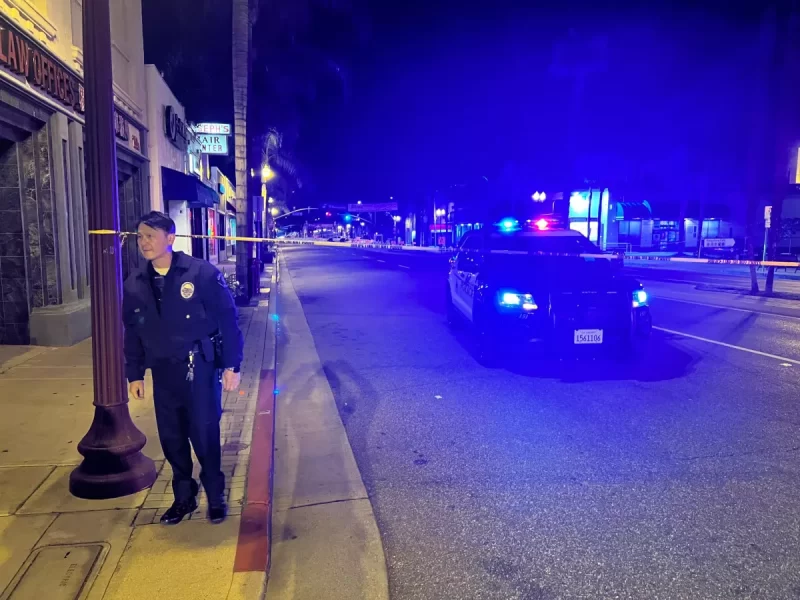
Asian American Journalists Cite the History
“This was not the Lunar New Year news we expected,” Emil Guillermo (pictured, below), a Filipino American who writes for the Asian American Legal Defense and Education Fund, began his column Sunday. “The rabbit year portends peace and hope, not fear and dread.
“And then came the mass shooting that left ten dead in Monterey Park.
“ ‘There is a male suspect that fled the scene, and remains outstanding,’ said Los Angeles County Sheriff Robert G. Luna at the very first press conference Sunday morning at the Monterey Park City Hall.
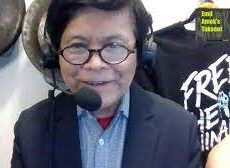 “And then Luna said something no one expected.
“And then Luna said something no one expected.
“ ‘Our very preliminary description has been described as a male Asian, and that’s from the scene here in Monterey Park.’
“A ‘male Asian.’
“The person being sought in connection to the murders of ten people, and the wounding of at least ten others at that dance studio in Monterey Park. is of Asian descent.
“Monterey Park is a city that’s 65 percent AAPI; where 42 percent speak Chinese; where the city council looks like the community it serves. In this unique enclave in America, the shooter is one of us.
“You were expecting a white supremacist . . .? “
The style guides on racial identification, such as this passage by the Associated Press, say, “use news judgment. Include racial or ethnic details only when they are clearly relevant and that relevance is explicit in the story.”
Eventually, the shooter’s name, Huu Can Tran, who is 72 and took his own life, was made public. There was no more need for editors to contemplate, as some did, whether the shooter’s Asian identity was relevant enough to mention. The Los Angeles Times used the police description: “an adult Asian man, about 5 feet 10 inches and weighing 150 pounds.”
The relevancy was apparent in the history.
The Times team of reporters quoted Winn Liaw, 57, who lives about two blocks from the dance studio, scene of the shooting. She “was in bed shortly before 11 p.m. Saturday when she heard what sounded like firecrackers. She assumed they were part of a Lunar New Year celebration until she heard helicopters starting to circle her neighborhood.
“She had woken early Sunday to check out the setup for the celebration that had been planned for later in the day when she learned about the shooting. Liaw said she is worried the shooting may have been motivated by anti-Chinese hate — a fear she said has been heightened by anti-Chinese rhetoric during the pandemic.
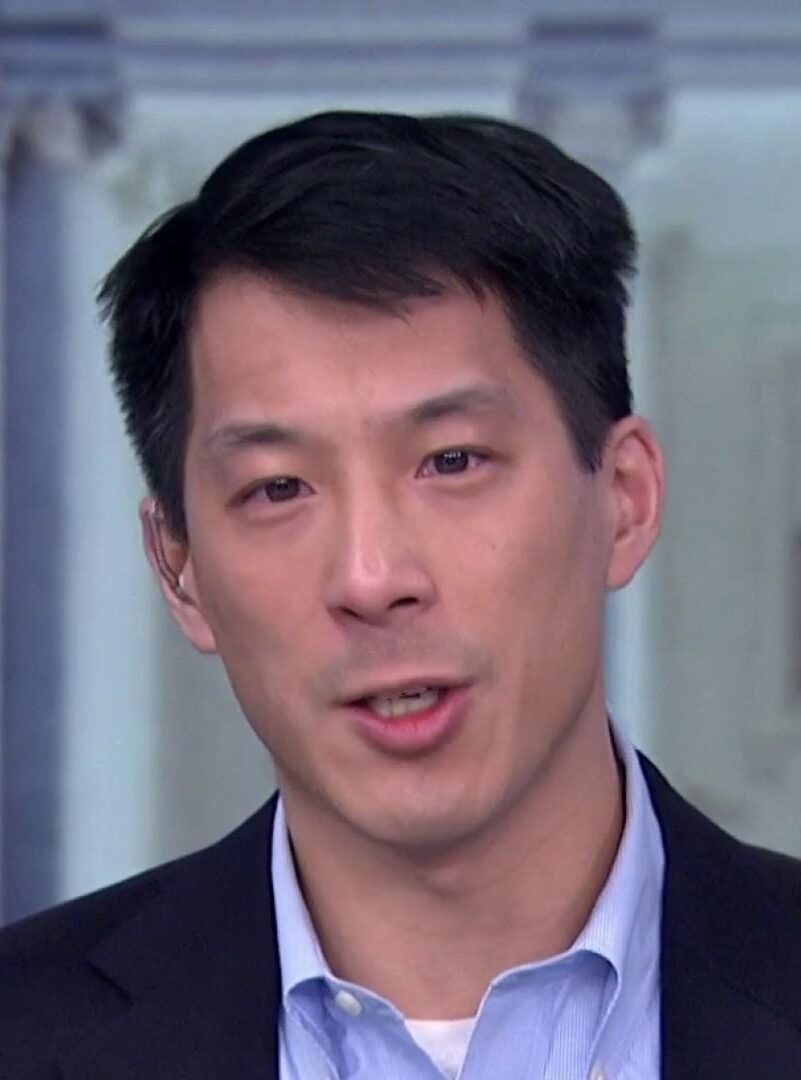 Before the suspect was identified, the New Yorker published its “Daily Comment,” this one a piece by Michael Luo (pictured), editor of newyorker.com who is Chinese American.
Before the suspect was identified, the New Yorker published its “Daily Comment,” this one a piece by Michael Luo (pictured), editor of newyorker.com who is Chinese American.
It was headlined, “The Spectre of Anti-Asian Violence in the Monterey Park Shooting: Waiting for details to emerge, there was the familiar apprehension and dread experienced by so many Asian Americans since attacks against them began to soar during the pandemic.”
“On Sunday morning, as I waited for more details of the shooting to emerge, inevitably, strands of history began converging in my mind,” Luo wrote. “I thought about a massacre that had taken place about a hundred and fifty years earlier in Los Angeles, just a few miles west of the site of the Monterey Park shooting.
“On the evening of October 24, 1871, an angry mob, bearing knives, pistols, and clubs, surrounded the city’s Chinese quarter and began dragging out terrified residents. By the end of the rampage, eighteen Chinese men had been killed, fifteen of them hanged, according to most accounts, in one of the worst mass lynchings in American history.
“In Monterey Park, at about half past eight o’clock in the morning, the authorities held another news conference. They revealed that the suspect was an Asian male. So that, it seemed, was that. Apparently just another mass shooting in America, the latest evidence that the country is overrun by guns. I thought about the emotions that I’d just experienced. Had I been paranoid? Too quick to believe that a racial motivation might be the cause? I returned to the history in front of me.”
His fellow Asian American, Guillermo, concluded, “It’s a hard lesson to learn about America in 2023. It’s just not the way I normally imagine this country’s great diversity. . . .
“We AAPIs are part of the great society, where guns are a thing. . . .”
Late news: “Seven people were shot to death on Monday afternoon in San Mateo County, Calif., the sheriff’s office said, the second mass shooting in the state in three days,” April Rubin and Jesus Jiménez reported for The New York Times.
- Chantal Da Silva, Safia Samee Ali, Andrew Blankstein and Corky Siemaszko, NBC News: Monterey Park suspect may have been targeting his ex-wife in the mass shooting, mayor says
- Emil Guillermo, Asian American Legal Defense and Education Fund: Half Moon Bay, Monterey Park, and the AAPI assimilation into America’s gun narrative (Jan. 24)
- New York Amsterdam News: Beyond the Barrel of the Gun Fellowship (The fellowship will last up to three months and includes a stipend of $10,000.)
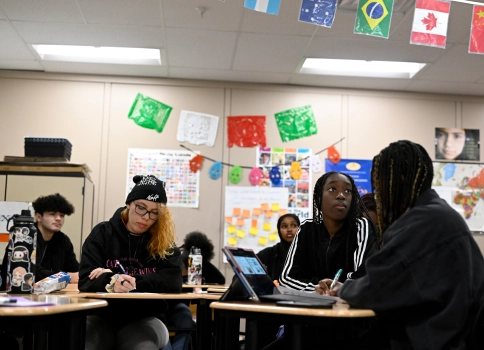
Disputed Course Includes Black Journalists’ Work
The Advanced Placement pilot course in African American Studies that was rejected in Florida includes specific attention to journalism and Black journalists, a professor who helped develop the course told Journal-isms.
Florida Gov. Ron DeSantis, speaking at a news conference unveiling his 2023 education platform on Monday, said the state wants “education, not indoctrination,” Cheyanne M. Daniels reported Monday for The Hill.
“In the state of Florida, our education standards not only don’t prevent but they require teaching Black history, all the important things, that’s part of our core curriculum,” DeSantis said.
“ ‘This was a separate course on top of that for Advanced Placement credit and the issue is we have guidelines and standards in Florida,’ he continued. ‘We want education, not indoctrination. If you fall on the side of indoctrination, we’re going to decline. If it’s education, then we will do.’
“Upon reading the course description, DeSantis said, he saw ‘it’s way more than that.’
“ ‘What’s one of the lessons about? Queer theory,’ said DeSantis. “Now who would say that an important part of Black history is queer theory? That is somebody pushing an agenda on our kids. And so when you look to see they have stuff about intersectionality, abolishing prisons, that’s a political agenda.
” ‘And so we’re on — that’s the wrong side of the line for Florida standards. We believe in teaching kids facts and how to think, but we don’t believe they should have an agenda imposed on them. When you try to use Black history to shoehorn in queer theory, you are clearly trying to use that for political purposes. ”
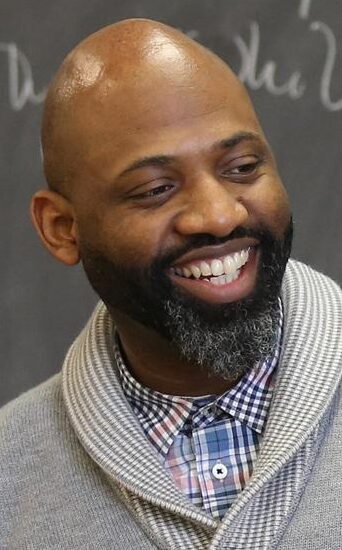 Christopher Tinson (pictured), who helped develop the AP course as chair of the African American Studies department at Saint Louis University, said that the work of Black journalists is among the recommended topics. “In certain sections of the AP course there are suggested readings from the Black press starting with Freedom’s Journal, but also in the sections on 20th century activism, including Ida B. Wells, [W.E.B.] Du Bois, and [Marcus] Garvey,” he messaged Journal-isms.
Christopher Tinson (pictured), who helped develop the AP course as chair of the African American Studies department at Saint Louis University, said that the work of Black journalists is among the recommended topics. “In certain sections of the AP course there are suggested readings from the Black press starting with Freedom’s Journal, but also in the sections on 20th century activism, including Ida B. Wells, [W.E.B.] Du Bois, and [Marcus] Garvey,” he messaged Journal-isms.
“Later there are suggested readings from Ebony magazine and Freedomways. That is mainly where the specific attention on journalism can be found. But as with any class, the professor determines which kinds of sources they would like to focus on. We just provided a range of possible sources they could use.”
As for Desantis’ Monday comments, Tinson said, “all of the statements coming out the Florida leadership are disingenuous. These kinds of statements are meant to feed an audience already suspicious of African American Studies in any form. It’s reductionist at best as it reduces the entire course to queer theory. I don’t have to be from that community to defend the right for students to learn about it.
“I wasn’t on the team that included that in the course, but it seems to stem from an attempt to bring the historical conversation about right, justice, social struggle, democracy and visibility into the current day. The entire course does not boil down to current events, but as with any other class, bringing students to the present-day issues is a good pedagogical technique. Moreover, the course and exam will be available to a limited number of students in any given school due to the built-in elite nature of AP in general. Reducing the entire course to that is simply inaccurate, disingenuous and disrespectful to the scholars who spent their time working on it.”
- Perry Bacon Jr., Washington Post: What more education on racial issues taught me
- Stacie Brensilver Berman, Robert Cohen and Ryan Mills, History News Network: Why CRT Belongs in the Classroom, and How to Do It Right
- Jeff Charles, Newsweek: No, Ron DeSantis Is Not Trying to Ban Black History
- Eliza Fawcett and Anemona Hartocollis, New York Times: Florida Gives Reasons for Rejecting A.P. African American Studies Class
- Daniel Golden, ProPublica: Muzzled by DeSantis, Critical Race Theory Professors Cancel Courses or Modify Their Teaching (Jan. 3)
- Juliana Kim, NPR: Florida says AP class teaches critical race theory. Here’s what’s really in the course
- Stephen Neukam, The Hill: Harris speaks to Florida lawmakers about DeSantis rejection of African American studies class
- New York Amsterdam News: Beyond the Barrel of the Gun Fellowship (The fellowship will last up to three months and includes a stipend of $10,000.)
- Liz Willen, Hechinger Report: Pop quiz: What state just banned an AP African American studies course?
“Among Mexican-Americans in the Southwest… there’s a saying: “They didn’t cross the border but rather, the border crossed them,” ABC’s “Nightline” told viewers in 2020 in its series on reparations. The Journal-isms Roundtable is planning a session Jan. 30 at 7 p.m. Eastern called “Who’ll Pay Reparations on My Soul?” It is to be simulcast on this Facebook page.
Should Mexican Americans Seek Reparations, Too?
“Dear California, my beautiful and resilient home state. Even with your wildfires, droughts and floods, I wouldn’t live anywhere else,” Ruben Navarrette Jr. wrote last week in his syndicated column.
“Yet, as a Mexican American, I’m not blind to history. For more than 150 years, my tribe has lived in ‘occupied’ territory. Mexican Americans were never enslaved or sold as property. But we have been subjected — like our Native American cousins — to the indignity of being treated like second-class citizens in our ancestral homeland.
“For Mexican Americans, that homeland isn’t Mexico. It’s the Southwest, which the United States stole from Mexico in 1848 and repurposed as eight U.S. states.
 “The mistreatment of Mexican Americans who were left behind began almost immediately.
“The mistreatment of Mexican Americans who were left behind began almost immediately.
“In 1855, the California Legislature enacted what became known as the ‘Greaser Law,’ which allowed for the arrest of anyone thought to be a vagrant. The law used the word ‘Greaser’ to refer to those with ‘Spanish and Indian blood.’ . . .
“Reparations may soon be on the agenda in California. On July 1, a first-in-the-nation task force is supposed to conclude a review process that lasted more than a year and file its final report to the legislature. . . .
“As I suspect is true with most Mexican Americans, I’d be offended if California tried to buy us off to get us to shut up.
“Yet, oddly, I’m more offended that state officials — including [California Gov. Gavin] Newsom and legislators — don’t seem to think the state owes Mexican Americans a nickel.
“So California, if you’re planning to settle up with other groups, you should at least acknowledge that Mexican Americans also have a claim — even if we don’t pursue it.
“The first debt incurred by the Golden State was to those who lived here long before the territory became a state and before gold was ever discovered. We are your original sin.”
- Carrie Blazina and Kiana Cox, Pew Research Center: Black and White Americans are far apart in their views of reparations for slavery (Nov. 28)
- Emmanuel Felton, Washington Post: A Chicago suburb promised Black residents reparations. Few have been paid. (Jan. 9)
- Ryan Fonseca, Los Angeles Times: What does California owe the descendants of enslaved Africans? Its reparations task force is working that out (Dec. 14)
- Suzanne Gamboa, NBC News: Grant helps spread forgotten history of racial violence against Mexican Americans (April 20, 2022)
- Jacquelyne Germain, CNN: The fight for reparations has stalled in Congress. Here’s what they look like in state and local governments (July 13)
- Rohan Naik, Latino Public Policy Foundation: How Texas’ history curriculum glosses over Mexican Americans (Aug. 13, 2019)
- Justin Phillips, San Francisco Chronicle: $5 million for each longtime Black resident? S.F. has a bold reparations plan to consider (Jan. 15)
- Rafu Shimpo: 76 JA, Asian American Organizations Call for Presidential Commission on Black Reparations (Dec. 24)
- Will Swaim, Wall Street Journal: California, Never a Slave State, Considers Reparations (Dec. 23)
Mvskoke Media speaks with Rebecca Landsberry-Baker, Mvskoke, and Joe Peeler about their new documentary premiering at the Sundance Film Festival about free press at the Muscogee Creek Nation. (Credit: YouTube)
Native Journalists’ ‘Bad Press’ Debuts at Sundance
“A surprising microcosm of larger political currents surfaces in Rebecca Landsberry-Baker and Joe Peeler’s documentary ‘Bad Press,’ ” Dennis Harvey wrote Sunday for Variety. The film premiered that day at the Sundance Film Festival, one of several by Indigenous filmmakers.
“They observe the chilling effect of institutionalized corruption within the Muscogee Nation, whose tribal government leaders appear inclined not just to cover their own misdeeds, but to actively block any journalists from reporting on them. Following events over the course of several years, this cautionary tale has an impact not unlike watching the rise of similar anti-transparency policies and politicians elsewhere of late: dismaying, yet with all the lurid appeal and colorful personalities of any juicy public scandal. . . .”
Harvey also wrote, “This first directorial feature for Landsberry-Baker (a Muscogee Creek tribeswoman and the executive director of the Native American Journalists [Association]) and veteran editor Peeler has the slightly giddy ‘are you seeing what I’m seeing?’ tenor of a classic muckraking narrative like ‘All the President’s Men.’
“That faint retro flavor is nicely amplified by Denisse Ojeda’s vintage-sounding electronic score. There’s an attractively spacious feel to Tyler Graim’s widescreen photography, mirroring local landscapes, while Jean Rheem’s editing balances characterful detail and humor with considerable narrative propulsion. Like the political skullduggery it depicts, ‘Bad Press’ tells a tale we’d love never to see played out again — yet watching it is undeniably entertaining.”
- Allison Herrera, KOSU/Oklahoma Public Media Exchange: Native films, filmmakers from Oklahoma and beyond make a splash at Sundance
- Lauren Wissot, Filmmaker magazine. “Independent Media Can Strengthen Tribal Sovereignty”: Rebecca Landsberry-Baker and Joe Peeler on Bad Press
80 Hired to Produce a Latino ‘Fox News’
 “Republicans have made notable inroads among Hispanic voters in recent election cycles,” Natalie Allison reported Monday for Politico. “Now, a conservative media network is looking to cement and further those gains by trying to become the Fox News of Spanish-speaking America.
“Republicans have made notable inroads among Hispanic voters in recent election cycles,” Natalie Allison reported Monday for Politico. “Now, a conservative media network is looking to cement and further those gains by trying to become the Fox News of Spanish-speaking America.
“Americano Media, which launched in March, is embarking on an aggressive expansion plan to shape center-right Hispanic opinion during the upcoming election cycle. The network has hired more than 80 Latino journalists and producers,” is expanding its “radio presence to television, and by the end of the year will have studios in Miami, Las Vegas and D.C. with reporters covering the White House, Congress and embedding in 2024 presidential campaigns. This month, Americano is launching a $20 million marketing campaign to draw in new viewers.
“It’s the latest development in an arms race to reach and win over the nation’s second-largest demographic group, one playing an increasingly critical role in election outcomes.
“ ‘We don’t have a Fox News in Spanish, and that’s what Americano intends to be,’ said the network’s CEO and founder Ivan Garcia-Hidalgo (pictured, above). He said he has listened to Hispanic Republican leaders lament for 25 years about the need for something like it, but no one ever took serious action. . . .”
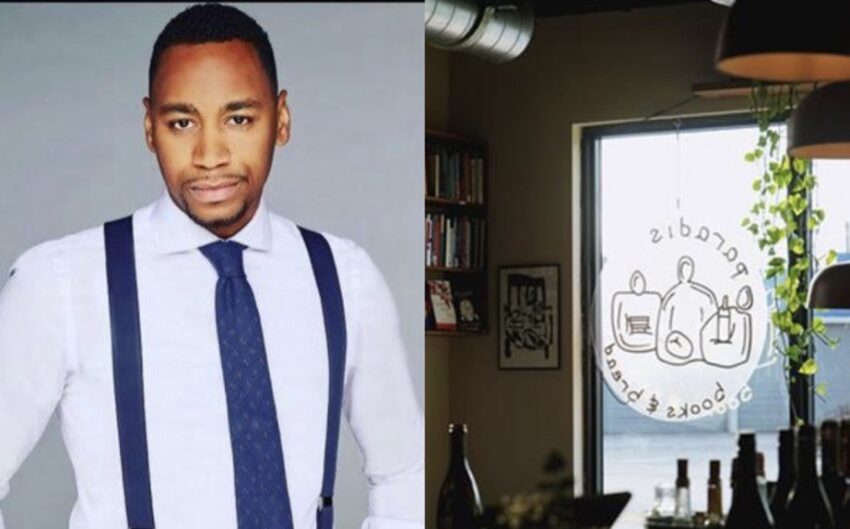
Fox News analyst Gianno Caldwell was asked to leave Paradis Books & Bread in North Miami. (Photos via @GiannoCaldwell/Twitter, Isabella Marie Garcia)
Fox Analyst Asked to Leave Miami Wine Bar
“A Fox News analyst walks into a Marxist Miami wine bar,” Jess Swanson wrote Sunday for Miami New Times. “No, it’s not the opening line to a joke but rather the impetus for a local small business being put on blast on network TV and social media for ‘lack of tolerance.’
“The bar is Paradis Books & Bread, a collectively owned North Miami bakery and wine bar with a ‘carefully curated selection of new and used books in and between the subjects of Black Studies, ~Critical Theory~, International Struggle & Solidarity Movements.’
“The Fox News flamethrower who was 86’ed is Gianno Caldwell, who promptly tweeted to his 135,700-plus Twitter followers that while he and his companions ‘were having discussions about politics we were told by the owner that we were not welcomed there because we aren’t politically aligned.’
“On Fox & Friends Weekend on Sunday morning, Caldwell elaborated on the incident to host Rachel Campos-Duffy, explaining that he and his friends had been discussing what it was like ‘working over at Fox News,’ ‘my values,’ ‘violent crime,’ and ‘progressive [district attorneys],’ when they were shown the door. . . .”
Swanson also wrote, “On its Instagram, Paradis clarified its version of events, stating that Caldwell’s group had been ‘talking about women in degrading ways, as well as using eugenic arguments around their thoughts on ‘Roe v. Wade’ and that ‘their behavior and their words made other folks in the space as well as one of us working very uncomfortable. . . ‘ “
She added, “Caldwell called on Florida Gov. Ron DeSantis to ‘look closely at what happened here.’
“Florida law, however, states that a licensed retail alcoholic-beverage establishment ‘may refuse service to any person who is objectionable or undesirable to the licensee, but such refusal of service shall not be on the basis of race, creed, color, religion, sex, national origin, marital status, or physical handicap.’ “
On Monday, the publication posted an update: “Paradis Books & Bread announced on Instagram yesterday that it is closing for its winter vacation earlier than originally planned. . . .”
- Grethel Aguila, Miami Herald: A Fox News analyst was booted from a North Miami cafe. Then came drama and harassment
- Lisa de Moraes, Deadline: Fox News Channel Signs Gianno Caldwell As Political Analyst (Sept. 25, 2017)
- Jenna Ryu and Morgan Hines, USA Today: A Fox News analyst was kicked out of a cafe, online hate ensued. What it says about us.
DePaul U. Hires Prof to Teach Bilingual Reporting
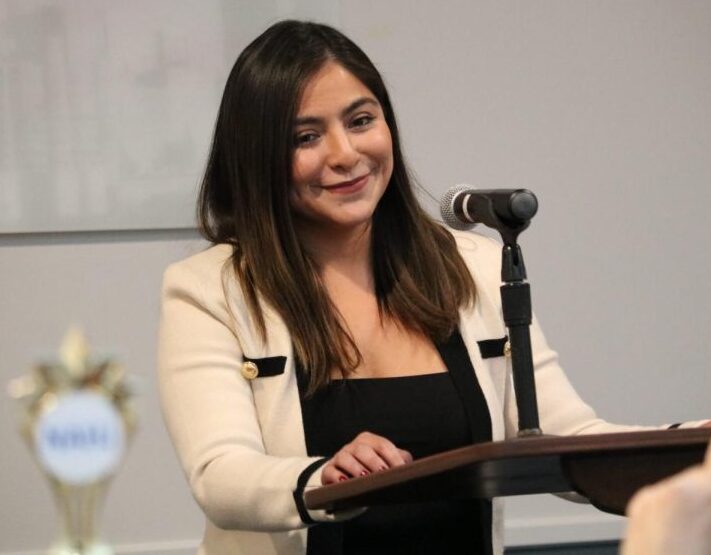 “When Laura Rodriguez Presa (pictured, by Kiersten Riedford) was an undergraduate journalism student at DePaul, she had no bilingual professors teaching courses centered around reporting on Latine communities,” Jacqueline Cardenas and Nadia Carolina Hernandez wrote Sunday for The DePaulia at DePaul University in Chicago.
“When Laura Rodriguez Presa (pictured, by Kiersten Riedford) was an undergraduate journalism student at DePaul, she had no bilingual professors teaching courses centered around reporting on Latine communities,” Jacqueline Cardenas and Nadia Carolina Hernandez wrote Sunday for The DePaulia at DePaul University in Chicago.
“ ‘It seemed like there was a clear line between Spanish and English media… It seemed like that was something that we could never change,’ Rodriguez Presa said.
“After years of experience working at the Chicago Tribune as a bilingual journalist covering the city’s Latine community, she will return to DePaul on Jan. 27 as the first bilingual reporting fellow to teach a Latine-focused journalism course this winter quarter.
“Rodriguez Presa is the first bilingual reporting professor DePaul has hired in 10 years. . . .
“DePaul has offered Spanish language reporting classes in previous years, though ‘it has been a while’ Associate professor and chair of Journalism in the College of Communication Jason Martin said. . . .”
Short Takes
- “Mayor Adams is taking media coverage into his own hands,” Michael Gartland and Chris Sommerfeldt reported Monday for the Daily News in New York. “Adams, who has grown increasingly cranky lately with how he’s covered by the City Hall press corps, launched a newsletter Monday that he claimed will counteract ‘distorted’ journalism about his administration. In a dig at the reporters who cover him every day, Adams said he decided to roll out the new initiative, ‘Hear From Eric,’ because ‘all the great stuff we are doing is being distorted or not being reported at all. . . . ”
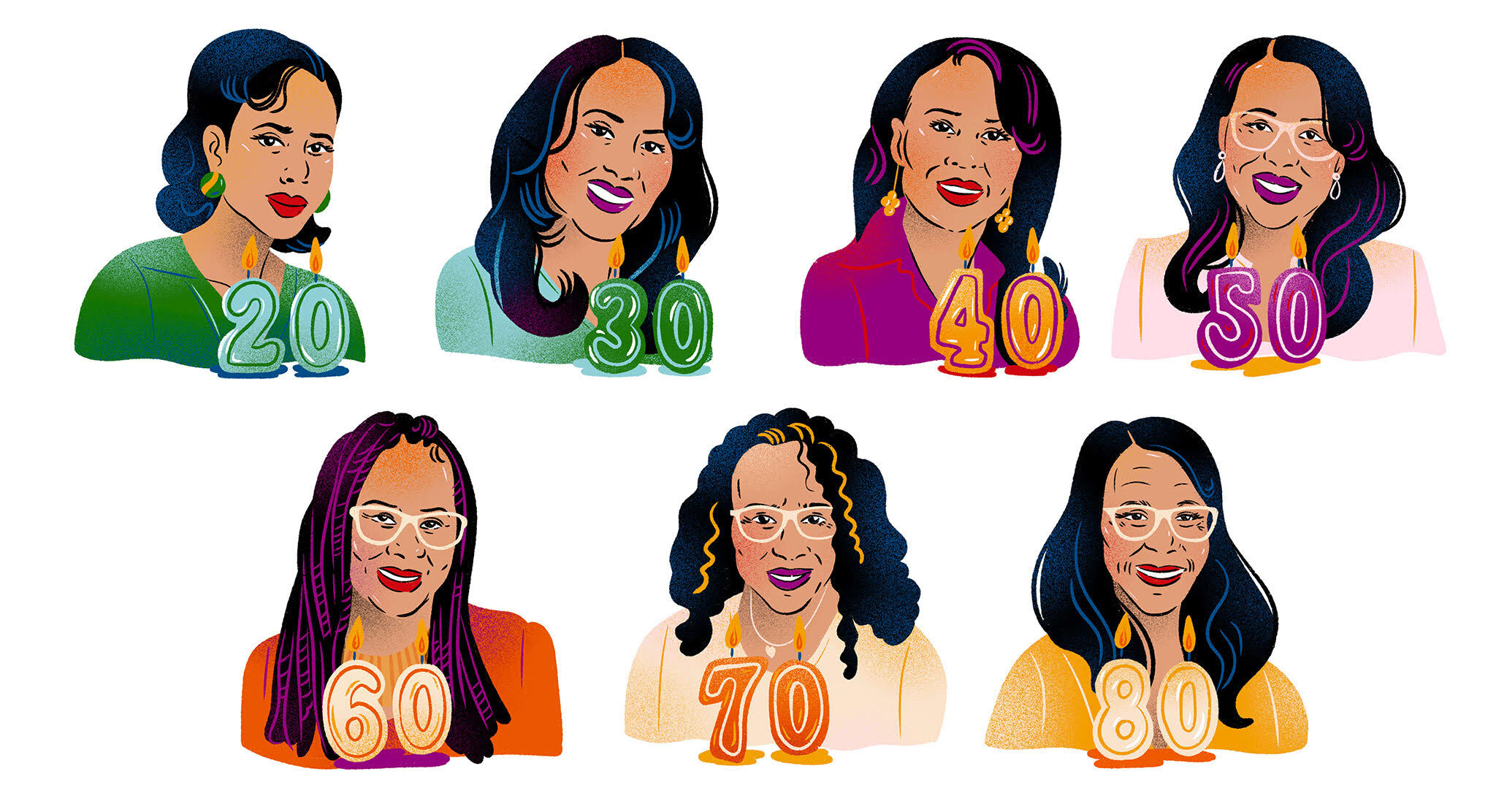 “Each decade of life brings a new set of complex financial considerations, and those decisions can be particularly difficult during times of economic uncertainty. To help simplify these choices, The Washington Post today debuts Michelle Singletary’s Money Milestones, a comprehensive guide with practical tips for navigating the financial decisions at each stage of your life,” the Post announced Monday.
“Each decade of life brings a new set of complex financial considerations, and those decisions can be particularly difficult during times of economic uncertainty. To help simplify these choices, The Washington Post today debuts Michelle Singletary’s Money Milestones, a comprehensive guide with practical tips for navigating the financial decisions at each stage of your life,” the Post announced Monday.
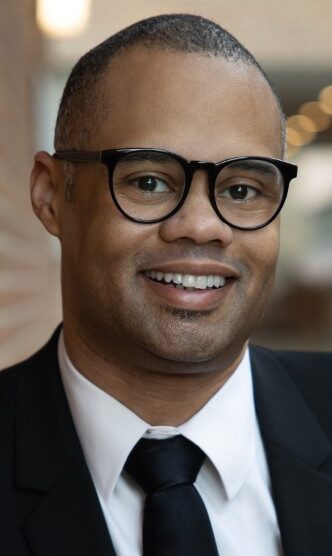 The HBCU Student Reporting Network, a paid reporting fellowship for student journalists to cover the historically Black colleges and universities they attend for broader audiences around the country, launched last week with an inaugural class of six, Hanaa’ Tameez reported Thursday for Nieman Lab. Jarrett Carter Sr. (pictured), who launched HBCU Digest in 2010, is editor and Wesley Wright is assistant editor. “It’s funded through grants from the Knight Foundation, Carnegie Corporation of New York, Craig Newmark Philanthropies, and the Scripps Howard Fund. The fellows will be paid a $1,200 stipend per month for the semester-long fellowship.”
The HBCU Student Reporting Network, a paid reporting fellowship for student journalists to cover the historically Black colleges and universities they attend for broader audiences around the country, launched last week with an inaugural class of six, Hanaa’ Tameez reported Thursday for Nieman Lab. Jarrett Carter Sr. (pictured), who launched HBCU Digest in 2010, is editor and Wesley Wright is assistant editor. “It’s funded through grants from the Knight Foundation, Carnegie Corporation of New York, Craig Newmark Philanthropies, and the Scripps Howard Fund. The fellows will be paid a $1,200 stipend per month for the semester-long fellowship.”
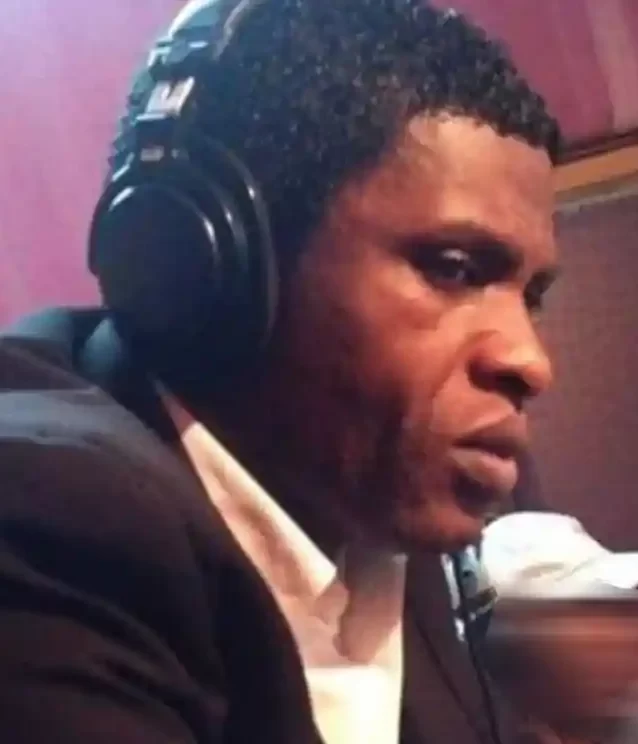 “The mutilated body of a prominent Cameroonian journalist was found on Sunday near the capital Yaounde five days after he was abducted by unidentified assailants, the press union and a colleague said on Sunday,” Amindeh Blaise Atabong and Edward McAllister reported for Reuters. “Media advocates described Martinez Zogo’s disappearance and death as a further sign of the perils of reporting in the African country. Zogo (pictured), the director of private radio station Amplitude FM, was kidnapped on Jan. 17 by unknown assailants after trying to enter a police station to escape his attackers, media watchdog Reporters Without Borders (RSF) said. . . .”
“The mutilated body of a prominent Cameroonian journalist was found on Sunday near the capital Yaounde five days after he was abducted by unidentified assailants, the press union and a colleague said on Sunday,” Amindeh Blaise Atabong and Edward McAllister reported for Reuters. “Media advocates described Martinez Zogo’s disappearance and death as a further sign of the perils of reporting in the African country. Zogo (pictured), the director of private radio station Amplitude FM, was kidnapped on Jan. 17 by unknown assailants after trying to enter a police station to escape his attackers, media watchdog Reporters Without Borders (RSF) said. . . .”
 “Ciro Gómez Leyva (pictured), one of Mexico’s best-known radio and television reporters, heard the shattering sound of gunshots ricocheting off his car window pane while driving home from work in his armored vehicle last month. The bulletproof glass saved him from becoming one more statistic in a deadly series of attacks against journalists in Mexico,” Mie Hoejris Dahl reported Monday for the Daily Beast. “The attack on Levya sparked massive outcry from fellow Mexican journalists, who put out a video and hundreds of tweets in support of Leyva in the aftermath of the assassination attempt. . . .”
“Ciro Gómez Leyva (pictured), one of Mexico’s best-known radio and television reporters, heard the shattering sound of gunshots ricocheting off his car window pane while driving home from work in his armored vehicle last month. The bulletproof glass saved him from becoming one more statistic in a deadly series of attacks against journalists in Mexico,” Mie Hoejris Dahl reported Monday for the Daily Beast. “The attack on Levya sparked massive outcry from fellow Mexican journalists, who put out a video and hundreds of tweets in support of Leyva in the aftermath of the assassination attempt. . . .”
- “The National Press Club is blasting Nexstar for striking a deal to broadcast the controversial Saudi-funded LIV Golf league on The CW,” Oliver Darcy reported for the CNN “Reliable Sources” newsletter. ” ‘We are deeply disappointed that a company that makes money from news like Nexstar would agree to participate in such a shameful PR stunt as LIV Golf, which is fundamentally designed to rehabilitate the Saudi reputation, tarnished irreparably by the state-ordered gruesome murder of journalist Jamal Khashoggi in October 2018,’ National Press Club President Jen Judson said Thursday night. ” ‘We are left to wonder what if anything Nexstar stands for. You cannot have a brand in news and act this way.’ “
 “It comes as no surprise that travelers still want to visit to Miami Beach and Key West in 2023 — both cities have long lured fans of sunshine, beaches and nightlife,” Connie Ogle reported Monday for the Miami Herald. “But apparently, many tourists are also longing to travel to Cuba.” She also wrote, “Tripadvisor also breaks down its awards into five other subcategories: food destinations, best places to ski, nature destinations, best places for culture and trending destinations, the latter a list of places with the largest year-over-year growth in interest on Tripadvisor, indicating new hot vacation spots. . . . And among those trending destinations, Cuba is the most popular in in the world.” It’s a different story for journalists, however. Reporters Without Borders says, “Cuba remains, year in and year out, the worst country for press freedom in Latin America.”
“It comes as no surprise that travelers still want to visit to Miami Beach and Key West in 2023 — both cities have long lured fans of sunshine, beaches and nightlife,” Connie Ogle reported Monday for the Miami Herald. “But apparently, many tourists are also longing to travel to Cuba.” She also wrote, “Tripadvisor also breaks down its awards into five other subcategories: food destinations, best places to ski, nature destinations, best places for culture and trending destinations, the latter a list of places with the largest year-over-year growth in interest on Tripadvisor, indicating new hot vacation spots. . . . And among those trending destinations, Cuba is the most popular in in the world.” It’s a different story for journalists, however. Reporters Without Borders says, “Cuba remains, year in and year out, the worst country for press freedom in Latin America.”
To subscribe at no cost, please send an email to journal-isms+subscribe@groups.io and say who you are.
Facebook users: “Like” “Richard Prince’s Journal-isms” on Facebook.
Follow Richard Prince on Twitter @princeeditor
Richard Prince’s Journal-isms originates from Washington. It began in print before most of us knew what the internet was, and it would like to be referred to as a “column.” Any views expressed in the column are those of the person or organization quoted and not those of any other entity. Send tips, comments and concerns to Richard Prince at journal-isms+owner@
View previous columns (after Feb. 13, 2016).
View previous columns (before Feb. 13, 2016)
- Diversity’s Greatest Hits, 2018 (Jan. 4, 2019)
- Book Notes: Is Taking a Knee Really All That? (Dec. 20, 2018)
- Book Notes: Challenging ’45’ and Proudly Telling the Story (Dec. 18, 2018)
- Book Notes: Get Down With the Legends! (Dec. 11, 2018)
- Journalist Richard Prince w/Joe Madison (Sirius XM, April 18, 2018) (podcast)
- Richard Prince (journalist) (Wikipedia entry)
- February 2018 Podcast: Richard “Dick” Prince on the need for newsroom diversity (Gabriel Greschler, Student Press Law Center, Feb. 26, 2018)
- Diversity’s Greatest Hits, 2017 — Where Will They Take Us in the Year Ahead?
- Book Notes: Best Sellers, Uncovered Treasures, Overlooked History (Dec. 19, 2017)
- An advocate for diversity in the media is still pressing for representation, (Courtland Milloy, Washington Post, Nov. 28, 2017)
- Morgan Global Journalism Review: Journal-isms Journeys On (Aug. 31, 2017)
- Diversity’s Greatest Hits, 2016
- Book Notes: 16 Writers Dish About ‘Chelle,’ the First Lady
- Book Notes: From Coretta to Barack, and in Search of the Godfather
- Journal-isms’ Richard Prince Wants Your Ideas (FishbowlDC, Feb. 26, 2016)
- “JOURNAL-ISMS” IS LATEST TO BEAR BRUNT OF INDUSTRY’S ECONOMIC WOES (Feb. 19, 2016)
- Richard Prince with Charlayne Hunter-Gault, “PBS NewsHour,” “What stagnant diversity means for America’s newsrooms” (Dec. 15, 2015)
- Book Notes: Journalists Follow Their Passions
- Book Notes: Journalists Who Rocked Their World
- Book Notes: Hands Up! Read This!
- Book Notes: New Cosby Bio Looks Like a Best-Seller
- Journo-diversity advocate turns attention to Ezra Klein project (Erik Wemple, Washington Post, March 5, 2014)

